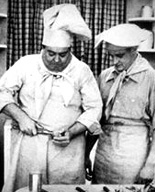





Spring 2008
A cultural approach to television's evolution
as a technology and system of representation. Considers television as a system
of storytelling and myth-making, and as a cultural practice, studied from
anthropological, literary, and cinematic perspectives. Focuses on prime-time
commercial broadcasting, the medium's technological and economic history,
and theoretical perspectives. Much required viewing as well as readings in
media theory and cultural interpretation.
Fours weeks will be devoted to the technological and economic history of American television. These classes will also examine the theoretical perspectives from which scholars and policy-makers have perceived our television system. The remainder of the semester will be devoted to a study of the evolution of television's fundamental genres of storytelling: situation comedy, westerns, police and private-eye programs, other forms of melodrama. These categories of storytelling will be studied in a context that emphasizes their continuities with story-forms that developed in other media, such as films, the stage, and prose fiction. Writing/term: to be determined. One midterm quiz, one final exam. Format: informal lectures/discussion. Much in-class analysis of passages from TV programs.
Classes: Tuesdays and Thursdays 3-4:30pm,
Rm 1-134
Screenings: Mon., 7-10pm, Rm 1-134
Attendance required at the following MIT Communications Forum events:
Prime Time in Transition
Thursday, March 6
5-7 pm, Bartos Theater
Global Television
Thursday, March 13
5-7 pm, Bartos Theater
Problems with this site? Contact the webmaster.
 |
|
||||
|
|
 |
|
|
||
 |
|
 |
|
||
| |
|
||||
 |
|
||||
|
|
|
||||
| |
|
||||
| |
|
||||
| |
|
||||
| |
|
||||
|
|
|||||
|
|
|||||
 |
|
||||